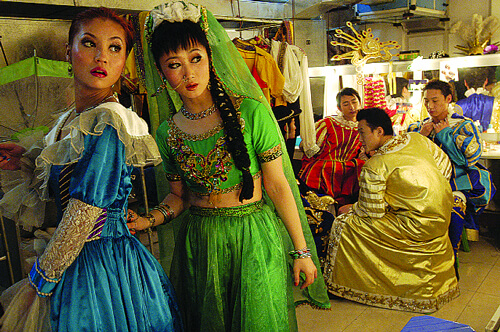Provincial young performers work at a Beijing tourist attraction acting out—on stage and off
In the film “The World,” by Chinese director Jia Zhang Ke, the actress Jing Jue plays Wei and Zhao Tao is Tao, two female performers at World Park, a Beijing theme park with historical reenactments of world events.
Over the course of four feature-length films, the Chinese filmmaker Jia Zhang Ke has mounted an ambitious chronicle of his country’s opening to capitalism. His project is akin to Rainer Werner Fassbinder’s lifelong work on recounting a complete history of 20th-century Germany.
Jia’s first film, “Xiao Wu,” was set in his hometown Fenyang, and centered on a pickpocket who watches most of his friends turn from petty crime to entrepreneurial success while he flounders. His second, “Platform,” broke new ground by creating a historical epic about 1980s China, depicting the endless tours of a troupe of entertainers who start out singing dreary Maoist propaganda songs and wind up discovering break dancing and synth-pop years after they have gone out of fashion in the West.
Up to that point, most of the films by directors of Jia’s generation were set in the present day; with “Platform,” he showed that he could treat the recent past with as clear an eye as the present. Until “The World,” his films have all taken place in China’s backwaters. He has now made a leap to the city, although his characters still come from rural areas and small towns.
“The World” is set in Beijing’s World Park, a tourist attraction that is part Las Vegas, part Epcot Center, with miniature monuments of the world’s historic sites. The Manhattan exhibit still has the Twin Towers and there’s London’s Big Ben, 100 feet away. Appearing in kitschy revues, singers pretend to be Japanese, Indian and African.
“The World” depicts the love lives and friendships of World Park’s employees, a large group of male guards and female performers.
Opening with a lengthy tracking shot following a dancer who’s looking for a Band-Aid, a panoramic backstage view of World Park is offered. Setting the tone for the rest of the film, the scene belongs in noisy clamor and ends in solitude.
World Park is a real place, whose directors were surprisingly pleased by Jia’s film, but it’s also a symbol of globalization’s illusory promises. For most of its workers, simply coming to Beijing is like visiting a foreign country. While they work alongside its replica, few will ever get to visit the Eiffel Tower. Rather than offering a real glimpse of other cultures, World Park reduces them to clichés––a few instantly recognizable landmarks, with modern New York and ancient Egypt standing side-by-side. Cross-cultural communication occurs once, between a Russian and Chinese woman who don’t even speak the same language.
As a symbol, World Park is a little facile. As a space to film, Jia puts it to great use. For the workers, World Park’s monuments are simply everyday surroundings. A painful conversation between a guard and his hometown friend, who notices that London Bridge resembles a rural dam, takes place near Manhattan. Jia creates deceptive skylines and separates the film into sections with titles like “Tokyo story.” Making the most of the potential for humor in World Park, he indulges bizarre juxtapositions. Two guards fight against a background including a live camel, a pyramid and a tiny version of the Sphinx.
It would be difficult to sum up the plot of “The World” in a paragraph. The press kit’s cast of characters includes 16 people. Even on a second viewing, it’s hard to keep them straight. The general gist, though, is hard to miss.
Most of them are unlucky in love and life. They’re the losers in a class war, stuck pandering to tourists while social boundaries prevent them from escaping the park. Other job opportunities for new arrivals in Beijing, like construction work, turn out to be low-wage hazards.
Jia shows a real knack for the effective use of tracking shots, but his film’s most memorable moments take place in front of a stationary camera, poised for a long take. He plays out the numerous uncomfortable conversations the camera captures to the breaking point.
In “Xiao Wu” and “Platform,” Jia’s style seemed rather austere, but he loosens up in “The World” by including animated sections, that dramatize characters’ ironic fantasies. After arguing with her boyfriend in an airplane set, a woman dreams of flying. But these fantasies fall very short of ever being fulfilled.
Jia’s films are as much about sociology as about storytelling. It’s ironic, therefore, that “The World” is his first film not banned by the Chinese government––a reflexive response Jia joked about in his third film, “Unknown Pleasures,” by showing a bootleg DVD vendor selling “Platform” and “Xiao Wu.” The new film’s characters suffer more from the impact of capitalism than their cousins in other Jia films. Unfortunately, “The World” introduces an unwelcome fatalist streak, which feels more European than Chinese, into his work. As the narrative progresses, characters must die to keep it moving. Usually a highly inventive director, he settles for an easy pessimism in the film’s final hour.
However, these flaws don’t detract from the film’s insights into globalization’s costs, and they’re balanced by a refreshing playfulness. Much of “The World” describes a situation specific to China, and World Park is quite a singular setting. Nevertheless, Jia’s work has something to say to Americans as well. Replacing the fake glamour of World Park with the bland backdrop of a Wal-Mart, much the same story could take place here.
“Platform” and “Unknown Pleasures” received extremely short New York runs and hopefully “The World” will find the American audience it deserves. It’s a news bulletin that demands attention.
gaycitynews.com


































